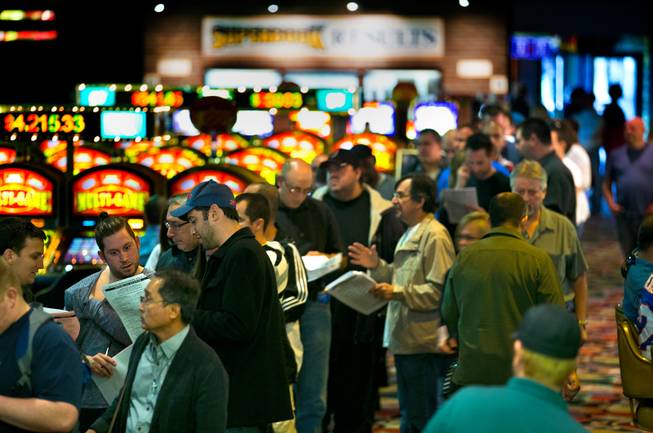
Lines stretch toward the door for Super Bowl sports betting at the Westgate Las Vegas on Saturday, Jan. 31, 2015.
Monday, March 9, 2015 | 2 a.m.
↪
Sports betting is having a big moment in the United States.
Prominent voices from professional sports and politics have indicated they’re willing to discuss expanding sports gambling, which is legal only in a handful of states. Meanwhile, Nevada has broadened the types of wagers it offers, and people appear to be betting on sports more than ever before.
CALLS TO EXPAND
The Professional and Amateur Sports Protection Act, passed by Congress in 1992, made sports betting illegal in almost every state. Nevada, Oregon, Montana and Delaware are exempt from the law, but beyond Nevada, wagering is allowed only on a limited basis.
So for now, Nevada is the only state with full-fledged legal sports betting, but that could change in the not-too-distant future.
Adam Silver, commissioner of the NBA, has said he supports legal sports betting. He told ESPN he spoke with commissioners of other sports leagues, and “all of them are interested in having a better understanding of the issue.”
U.S. Sen. John McCain, R-Ariz., who once tried to outlaw college sports betting in Nevada, told ESPN that “we need a debate in Congress” about allowing sports bets in more states.
“It has fully cascaded into a tidal wave of momentum,” said Daniel Wallach, a gaming and sports law attorney.
Wallach said there’s no question sports leagues are coming around to the idea of pulling sports gambling off the black market and regulating it.
In fact, the American Gaming Association made cracking down on illegal wagering a top priority for 2015. AGA President Geoff Freeman told a conference of mayors that his group is keeping tabs on sports gambling, the laws behind it and the best course of action for the gaming industry.
POPULARITY SOARS
While elected officials mull over a possible expansion, one point is clear: In the only state with legal sports books, the industry’s popularity has reached new heights.
Last year’s Super Bowl was the most-wagered game of all time, and this year was a close second. Sports books also saw a boost last summer during the World Cup.
Nevada’s annual sports pool revenue, which doesn’t include race books, has grown consistently over the past few years, surpassing the peak it reached before the recession.
Would Nevada sports books continue to grow if more states had legal betting? Experts’ opinions are split.
Joe Asher, CEO of William Hill U.S., doesn’t believe sports betting in other states would harm Nevada.
“Nothing beats coming out to Vegas for the opening weekend of March Madness,” Asher said.
But Union Gaming analyst Chris Jones said if sports books were to become legal in other markets, Nevada could suffer because “nothing trumps convenience.”
Jones said the loss wouldn’t be felt on the casino floor but in other areas of the gambling industry, such as food and beverage sales.
STATE-LEVEL EXPANSIONS
Major athletic events such as the Super Bowl and March Madness have long meant big business for Nevada sports books. But the industry for years has been barred from taking bets on the Olympic games.
Last month, the Nevada Gaming Commission changed regulations to permit Olympic wagering. Even though it’s not expected to bring in a huge amount of revenue, commission Chairman Tony Alamo said it’s a “big deal” that “globalizes the legitimacy of what we do.”
While Nevada diversifies the types of sports bettors can wager on, New Jersey has tried — so far unsuccessfully — just to break into the industry. Voters there passed a ballot measure saying they wanted sports betting, and Gov. Chris Christie signed a law permitting it, but no sports books have opened their doors yet because major sports leagues sued.
Now, New Jersey is in a legal battle with the leagues. The case is scheduled to be heard in federal court this month.
ROLE OF TECHNOLOGY
There isn’t one clear explanation behind the growth of sports betting, but technology certainly has played a role.
These days, you don’t even have to visit a sports book to place a bet in Nevada. People can gamble via their phones, using one of several popular apps.
Sports betting has become so popular that Asher said William Hill now gets about 40 percent of its handle from mobile devices. And the company’s in-person handle has increased, too.
The Internet also has fueled interest, as the popularity of fantasy sports has surged. Websites such as FanDuel offer cash prizes in daily online contests that many see as similar to gambling.
Wallach said the popularity of such sites has opened the eyes of the leagues to “all the good that can come from legalizing sports betting.”

Join the Discussion:
Check this out for a full explanation of our conversion to the LiveFyre commenting system and instructions on how to sign up for an account.
Full comments policy